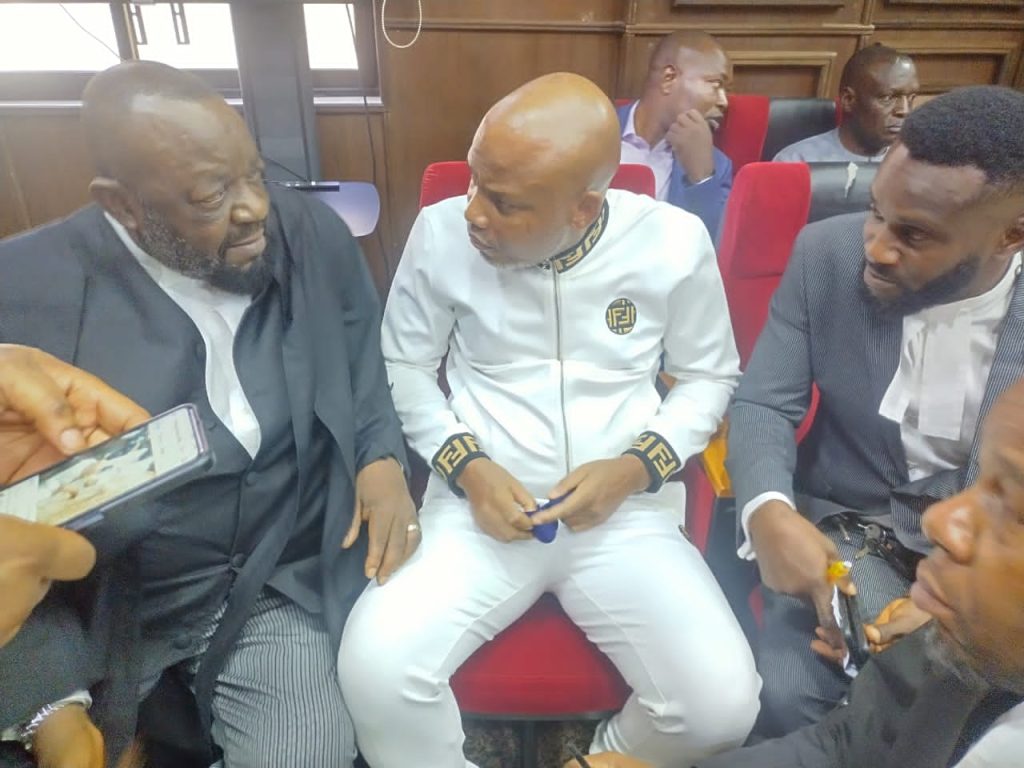
IPOB leader, Nnamdi Kanu, with his lawyers at a Federal High Court, Abuja on Monday
Update: Court to rule on Nnamdi Kanu’s bail plea, preliminary objection March 19
A Federal High Court, Abuja, on Monday, fixed March 19 for ruling on the bail application filed by Nnamdi Kanu, leader of the Indigenous People of Biafra (IPOB).
Justice Binta Nyako will, also on the same date, rule on a notice of preliminary objection filed by Kanu praying the court not to allow his trial until certain conditions were met by the Federal Government.
Justice Nyako fixed the date after the new counsel for the Federal Government, Adegboyega Awomolo, SAN, and Kanu’s lawyer, Alloy Ejimakor, adopted their processes and presented their arguments for and against the motions.
The News Agency of Nigeria (NAN) reports that the IPOB leader was initially standing trial on a 15-count charge bordering on terrorism offences before eight of the counts were quashed by the trial judge leaving seven counts, and the Supreme Court, on Dec. 15, 2023, affirmed the lower court decision.
When the matter was called on Monday, Awomolo told Justice Nyako that the case was coming up for hearing after the decision of the Supreme Court on Dec. 15, 2023.
Awomolo said the apex court affirmed Nyako’s decision of April 8, 2022, by preserving counts one, two, three, four, five, eight and 15 of the charge which Kanu pleaded not guilty of.
The senior lawyer said that the Supreme Court ordered the continuation of trial of Kanu on the remaining seven counts.
“So we are ready to proceed with the hearing of this matter and it is in the defendant’s interest and everybody’s interest in this country to see to the end of the trial” he said.
But Counsel to Kanu, Ejimakor, told the court that he had two motions; an application for bail and a preliminary objection.
He said though he agreed that the Supreme Court directed the continuation of Kanu’s trial, they were not ready to continue the proceedings.
He urged the court to take his client’s bail application and preliminary objection for court to decide whichever way, and the prosecution did not object.
While given grounds why the bail plea should be granted, Ejimakor said Kanu currently suffered from life-threatening and serious health conditions.
According to the lawyer, Kanu has heart disease, hypertension and dangerous potassium levels that pose daily risks to his life while in detention.
He argued that the DSS had no standard medical facility that could treat the defendant but was only subjected to cell-grade medical treatment, which did not abate his conduction but instead worsened it.
He urged the court to grant the bail request on most liberal terms to enable the IPOB leader seek better medical care he urgently requires.
He said though Section 161 of Administration of Criminal Justice Act (ACJA), 2015, raised three conditions for bail to be satisfied, Kanu had met those terms, including ill-health, delayed proceedings and not being given adequate time and facilities to prepare for his defence.
Ejimakor alleged that the prosecution, since Kanu’s arrest and arraignment, had delayed the proceedings for several months through amendment of charges and adjournments
He also argued that he might not be able to put up a good defence unless Kanu was admitted to bail to have unfettered access to his lawyers.
Contrary to the prosecution’s counter affidavit that Kanu jumped bail, the lawyer argued that Kanu only fled for his dear life when his residence was attacked by security agents and that as far back as October 2018, he deposed to an affidavit to explain the circumstances.
But Awomolo disagreed with Ejimakor, insisting that the defendant violated the bail conditions, jumped bail and fled the country,.
He said there was no evidence before the court that if granted another bail, he would not jumped bail, urging the court to dismiss the application.
The senior lawyer said Kanu’s failure to prove that there was no standard medical facility in Department of State Service (DSS)’ detention contradicted Section 161(2a) of ACJA.
“So he has not been able to satisfied Section 161(2a),”:he said.
He argued that the IPOB leader had not tendered anything tangible or extraordinary to show he was entitled to bail.
On the delayed proceedings, Awomolo said the court itself observed that both parties were responsible.
The lawyer, who argued that the Supreme Court had settled issues about Kanu’s rendition, said other judgments in favour of the IPOB leader were only persuasive, and not binding on Justice Nyako.
On the preliminary objection, Ejimakor said the application prayed for an order that before any proceeding could commence in the trial, the Federal Government must cease and desist from certain conducts.
He said these include seizure of documents of his lawyers, stopping his lawyers from taking notes during visitation, and eavesdropping on Kanu’s consultation with lawyers on matters pertaining to his defence,
He also sought an alternative order that before commencement of trial, a non-custodial arrangement be made so as to afford Kanu adequate time and facilities to prepare for his defence.
But Awomolo, who opposed the application, described it as an abuse of court process.
He argued that a party cannot dictate to court how to conduct its proceedings.
He said it was an insult to the court for a party to dictate that unless the detaining authority acts in certain ways, trial should not commence.
The lawyer, who said that the prosecution had never breached the fundamental rights of the IPOB leader, urged the court to dismiss the application.
Justice Nyako adjourned the matter until March 19 for ruling and trial commencement for March 20. NAN
